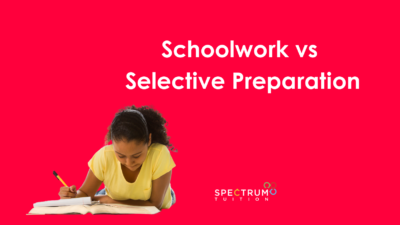Sitting a three-hour exam that tests both your abilities and mental stamina is a significant challenge for many students. Selective exams often include material that goes beyond the regular school curriculum, making the preparation even more demanding. It’s not just about what you know, but how well you can apply your knowledge under pressure. For many students, understanding these differences can be the key to effective preparation and success.
In this article, we will delve into the specific differences between selective exam preparation and regular schoolwork for each section of the exam. By identifying these distinctions, you can tailor your study approach to better meet the demands of the selective exam. We’ll cover strategies, tips, and insights to help you navigate this challenging journey with confidence.
Reading Comprehension:
Selective Preparation:
Students are required to interpret and analyse complex diagrams and texts that span various genres, such as scientific articles, historical documents, and literary excerpts. This demands a higher level of critical thinking and the ability to draw connections between disparate pieces of information.
Schoolwork:
Typically focuses on reading longer texts or novels, followed by writing responses or essays. This process usually involves understanding the plot, characters, and themes, and forming structured, cohesive arguments over an extended period.
Mathematics:
Selective Preparation:
Emphasises advanced problem-solving skills where students must interpret diagrams, understand complex scenarios, and apply multiple mathematical concepts simultaneously. Questions often involve real-world applications, requiring students to think critically and creatively.
Schoolwork:
Generally involves answering individual questions from a textbook, which may be more straightforward and focused on one concept at a time. The depth of knowledge required is often less comprehensive than in selective preparation.
Numerical Reasoning:
Selective Preparation:
Includes puzzle-based questions that test abstract reasoning skills. These puzzles might involve patterns, sequences, or logical deductions that are not typically covered in standard maths classes. Students need to develop strategies to approach these problems efficiently.
Schoolwork:
Numerical reasoning in school might involve more routine calculations and straightforward problem-solving, often within a familiar context.
Verbal Reasoning
Selective Preparation
Focuses on logical puzzles that require students to deduce answers from given information. This might include analogies, syllogisms, and other forms of logical reasoning that are less common in regular school curricula.
Schoolwork
School-based English typically emphasises essay writing, understanding grammar and punctuation, and constructing well-organised arguments. The logical deduction aspect is not as heavily emphasised.
Essay Writing:
Selective Preparation:
Students must write fully structured, coherent, and insightful essays within a limited time frame (often just 20 minutes). This requires quick thinking, strong organisational skills, and the ability to articulate ideas clearly and concisely under pressure.
Schoolwork:
The essay-writing process in school usually involves multiple drafts over several lessons, allowing for more thorough research, planning, and revision. This approach supports the development of ideas and the refinement of writing over time.
If you believe that your child would benefit from attending a selective school, please click on the button below to complete a free assessment.
Click here to start your free assessment


